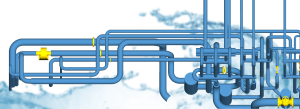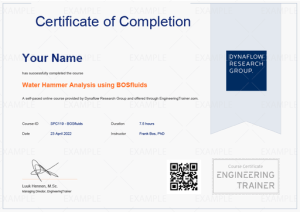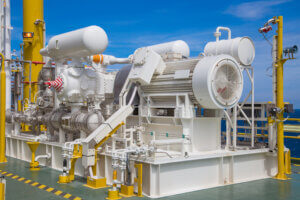
Water Hammer Analysis using BOSfluids
Training Courses Water Hammer Analysis using BOSfluids: Surge Analysis Download Brochure About The Course This course teaches you all the fundamentals of performing water hammer
This course imparts fundamental knowledge of pressure pulsations in piping, particularly in the context of API 618 analyses related to reciprocating compressors. Through real-life case studies, you will gain insights into the origins and potential implications of pulsations caused by compressors.
The instructor will cover assessment techniques, including pulsation analysis using software, and guide you through conformity checks for pulsations and resulting vibrations. Additionally, the course addresses possible mitigation measures and best design practices.
Practical discussions and analyses will be demonstrated using BOSpulse software, with no prior knowledge of the software required.
Welcome & Your instructor
Content Overview
How to use this course
Questions Forum
Pressure pulsations Foundations – Part 1
Pressure pulsations Foundations – Part 2
Shaking forces due to pulsations
Periodic excitations in piping systems
Pulsation control in piping systems
Acoustic resonance in piping systems
Acoustic resonance typical problematic modes
Orifice plates to change modes
General considerations for piping systems
Recap of Module 1
A sample of the first module is available for free, so you can learn more about the teaching style and understand if the course fits your needs.
Case Introduction
Operating modes
Result discussion
Damper design
Vibration risks in piping systems
Types of vibrations in piping systems
Mechanical excitation due excitation source
Single DOF systems Degree Of Freedom
Mechanical response to pressure pulsations
Mechanical eigenmodes in piping systems
Evaluating vibration in piping systems
Mechanical response versus acoustic response
Case Introduction
Compressor harmonics
Mechanical resonance
System modifications
Conclusions
Course evaluation survey
Your Personal Certificate
Rate this course
Related resources
Follow up
Self-Paced
This course is self-paced and is not subject to specific dates. The course contains 4 modules with a total of 2.5 hours of content which can be performed at your own pace. A personal certificate will be provided to you if you finish the course within the first month after purchase. This incentive aims to motivate you to perform the course on time, thereby improving your learning curve.
Classroom
This course is scheduled over a 1 work day. The dates of the course are organized upon inquiry.
This course is available in self-paced, and classroom formats.
Prerequisites and level
Intended For
This course is designed for:
Access to the self-paced course
After your purchase is confirmed you receive an account to the EngineeringTrainer online learning portal, where you can find the course in your dashboard. After opening the course you will be guided step-by-step through the different modules. You receive 1-year unlimited access to the course, allowing for the repetition of modules as desired.
Learn by doing
The course is mainly based on video content: video lectures and video software demonstrations. English subtitles are available and videos can be viewed as many times as desired. The video lectures help you to grasp the important technical concepts and in the video demonstrations the instructor uses the software and discusses all the steps and actions. You are recommended to follow the steps of the instructor in the software to optimize your learning curve.
The classroom course is performed in person either on-site or in the Dynaflow Research Group office located in Rijswijk, The Netherlands. This course enables you to be face-to-face with the instructors with live examples provided. This course also provides all participants with a 1-year access to the self-paced course.
Exercises are available in the form of multiple-choice quizzes to help you grasp technical concepts and in the form of .pdf files with instructions to build and analyze different models and answer related questions. Video demonstrations of the exercises are available.
Participants of the self-paced course receive a personal digital certificate if they meet the following requirements:
Participants of the classroom course receive a personal physical certificate upon the completion of the course.
Example certificate:

After this course, participants are expected to:
Video lectures,
Video demonstrations,
Discussions forum with other participants & instructor.
The majority of training material are videos. These are not available for download, but can be accessed directly with your account on the portal. Apart from quizzes the exercise files can be downloaded. These can include .pdf files with the exercise questions, software models or other file types.
You receive 1-year unlimited access to the course. This allows you to watch content again if this is beneficial for your work projects.
We encourage participants to submit feedback and questions in the Discussions Forum of the course. These are either answered directly in the forum or form the basis for new videos that are added to the online course on a regular basis.
Participants receive 1-year unlimited access to the course including new videos that are added during this year. Participants receive an email notification upon addition of new course videos.
No software is required for participants of this course.
Demonstrations are provided using the software BOSpulse, but having access to this software is not required.
If your computer and internet connection is able to play videos online (YouTube) you will be able to follow the course. Note that almost all browsers are supported, except for Internet Explorer.
Yes, this course qualifies for PDH hours as per the NCEES CPC Guidelines.

Training Courses Water Hammer Analysis using BOSfluids: Surge Analysis Download Brochure About The Course This course teaches you all the fundamentals of performing water hammer

Training Courses Pulsations And Vibrations: Reciprocating Compressors Download Brochure About The Course This course imparts fundamental knowledge of pressure pulsations in piping, particularly in the

Training Courses How to Review a Pulsation Study About The Course Pulsation studies can result in quite elaborate and complex reports with large output data
Laan van Oversteen 20
6th floor
2289 CX Rijswijk
The Netherlands
© Dynaflow Research Group BV